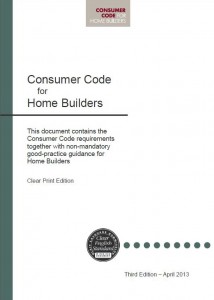After close examination of the recent Adjudication Scheme case histories, we ask……..Is the Consumer Code for Home Builders worth the paper it is written on? The clue is in the name “For Home Builders” not for homebuyers. At best, house builders tend to view the Code as voluntary or optional despite many of the Code requirements actually being required by consumer legislation. At worst, as is shown by the published case summaries, house builders knowingly continue to disregard the Code requirements in the full and certain knowledge that the worst that could happen would be slap on the wrists and a small award against them. Now in it’s fifth year, the Code is frequently referred to by the industry being used as an opportunity to promote new homes.
 The Consumer Code for Home Builders was launched in April 2010 apparently as a response to the Barker Review in 2004 and Office of Fair Trading – Market Study of Home Building in the UK published in October 2008. The Consumer Code is allegedly the house building industry’s response to the issues raised in those reports relating to customer service and satisfaction. It was created by a “group of stakeholders within the industry” who “joined forces to consider the issues raised” to “produce a Code of Conduct for home builders.” It was first launched in April 2010 – over FIVE YEARS after the deadline in Barker’s report!
The Consumer Code for Home Builders was launched in April 2010 apparently as a response to the Barker Review in 2004 and Office of Fair Trading – Market Study of Home Building in the UK published in October 2008. The Consumer Code is allegedly the house building industry’s response to the issues raised in those reports relating to customer service and satisfaction. It was created by a “group of stakeholders within the industry” who “joined forces to consider the issues raised” to “produce a Code of Conduct for home builders.” It was first launched in April 2010 – over FIVE YEARS after the deadline in Barker’s report!
 The Code claims to: “provide protection and rights to purchasers of new homes, ensuring that all new home buyers are treated fairly and are fully informed.” But the protection already exists with The Consumer Protection from Unfair Trading Regulations 2008, making it a legal requirement to treat consumers fairly and The Business Protection from Misleading Marketing Regulations 2008 reinforces the legal requirement not to make misleading or false statements. The Consumer Code for Home Builders if strictly followed, should result in compliance with the legislation, probably the main reason it was created by the house building industry.
The Code claims to: “provide protection and rights to purchasers of new homes, ensuring that all new home buyers are treated fairly and are fully informed.” But the protection already exists with The Consumer Protection from Unfair Trading Regulations 2008, making it a legal requirement to treat consumers fairly and The Business Protection from Misleading Marketing Regulations 2008 reinforces the legal requirement not to make misleading or false statements. The Consumer Code for Home Builders if strictly followed, should result in compliance with the legislation, probably the main reason it was created by the house building industry.
The Code applies to all house builders registered with the new home warranty providers such as the NHBC, LABC Warranty and Premier Guarantee. It consists of 19 requirements and principles that house builders must adhere to in marketing, selling homes and their after-sales customer service. Failure by a house builder to adhere to the code requirements can result in exclusion from all registers run by the warranty bodies that participate in the scheme. Has this ever happened? Very unlikely!
But is the Consumer Code effective? – Do house builders strictly follow it? – Are punitive penalties being imposed on builders who are found to have deliberately breached the Code? Going by the latest published Adjudication Case Summaries for 2013 it would appear not.
 From the case summaries made available by the Consumer Code for Home Builders so far, a total of 45 cases have been adjudicated. Of these, just 21 were found in favour of the homebuyer – 46%. The total awarded to buyers was £56,195 – just 43% of the total claimed (£130,749) in these successful cases.
From the case summaries made available by the Consumer Code for Home Builders so far, a total of 45 cases have been adjudicated. Of these, just 21 were found in favour of the homebuyer – 46%. The total awarded to buyers was £56,195 – just 43% of the total claimed (£130,749) in these successful cases.
The number of cases brought by buyers in the last 13 months has increased by over 53%. The main areas of dispute were:
- Failure to provide adequate pre-purchase information or misleading purchase prices.
- Misrepresentation of property description
- Failing to build to agreed specification
- Pressure from house builders for buyers to agree to contractual changes
- Breach of reservation agreement
- Non-repayment of reservation fees
Case 18 – December 2013 – 117130018 – A homebuyer was sold the incorrect property and it took a year to resolve the issue. The house builder accepted that an “administrative error” on their part had resulted in the wrong plot being recorded on the Reservation Form and the Contract of Sale, leading to the incorrect property being conveyed to the unfortunate buyer. However they said the buyer’s solicitor should have picked up on the error. Yet despite breaching sections 2.6, 3.1 and 5.1 of the Code the Adjudicator only “found the claim succeeded in part” and awarded £250 for inconvenience (the maximum allowed) and reimbursed the £120 fee because “no evidence of monetary loss was provided.” Obviously if you cannot rely on housebuilders to write the correct plot number on the Reservation Form how bad can it get? This had serious implications for the buyer with both the mortgage and home insurance possibly invalidated (presumably another buyer was also conveyed the wrong plot too).
Case 4 – April 2013 – 11713003 – The homebuyer claimed the housebuilder had misrepresented the service charge estimate in pre purchase information. They indicated it would be £1,200 – £1,300 but actually knew it would be £2,300 £1000 more. The buyers sought damages totalling £15,000 (the Code maximum claim value) for the ongoing difference between the stated and actual service charge, over the 25-year mortgage period. The housebuilder also stipulated which solicitor the buyer should use, even pre-filling their choice on the reservation form! The housebuilder breached 2.1, 2.5 and 2.6 of the Code. The homebuyer was awarded just £2,703 based on the difference in service charges he was likely to pay over 5 years. The adjudicator considered this to be “a more likely timeframe to spend in one property”.
Case 15 – December 2013 – 11730015 – (Claim £5,884) was found to breach 2.1, 2.5 and 2.6 of the Code yet the buyers only awarded £250 for inconvenience and the £120 fee.
Case 16 – December 2013 – 11730016 – (Claim £6410) was found to breach 1.5 and 2.1 of the Code yet the buyers were awarded nothing.
Case as yet unreported – 11730019 – Breach of 1.5 and 2.1 of the Code. The buyers were awarded nothing.
Four separate cases, the same complaint, in the same building, with the same house builder, one awarded £2,700, one £250 and two get nothing at all. So much for consistency and fairness. Presumably by then, these buyers were made aware of the builder’s lies before they exchanged contracts! We know who this large top 4, plc housebuilder is, but cannot name them (yet) as the buyer has an ongoing legal action against them in Brentford County Court.
According to Noel Hunter Chairman of the Consumer Code, the Consumer Code “makes an important contribution [to consumer confidence] by supporting the integrity of the sales process” From the 2013 Annual Report and latest published case summaries, this is clearly not the case.
No doubt the industry would highlight that few claims are made by buyers. But the reason could be because the majority of new homebuyers are totally unaware of the Code, as apparently are those that sell new homes! In the 2013 Annual Report, the Code’s mystery shopping market research found that only 13% of sales offices could provide a copy of the Code for buyers to take away. This despite requirement 1.2 of the code stating “house builders must give a copy to customers who ask for it and to all home buyers who reserve a home.” It also found that only 22% of those asked, could fully answer questions regarding the Consumer Code. Again despite requirement 1.4 stating “Home Builders must provide suitable training to all staff who deal with Home Buyers” More worryingly, is that the code report that “only 50% of contracts are currently substantially compliant with the Code”
To win a case against a house builder using the Code Adjudication Scheme, new homebuyers need proof and evidence to justify their claim. Without it, previous case history would indicate that they are very unlikely to succeed and even if they do, in all probability they will only be awarded a small fraction of the total amount of their claim. New homebuyers would be well advised to make audio recordings when asking questions and seeking clarifications in house builder’s development sales centres. In addition, everything agreed should be recorded in writing and signed by BOTH the builder’s representative and buyer and buyers should take a copy with them at the time.
It is also worthwhile to make a formal Subject Access Request to the house builder before using the CCHB Adjudication Scheme so you have all the relevant information the housebuilder could use in their defence. It will only cost £10 and, if nothing else, it will waste a substantial amount of the builder’s time collating and copying all the information they leaglly required to provide.





